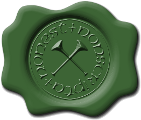
| Home | FAQs | Rules | Archives | Articles | Jobs | Links | KWHSS | OSCAR | SCA.org |
Collected Name Resources from LoARs (2010-present)
Articles from Juliana de Luna, Lillia de Vaux, and Alys Mackyntoich
- Scots and Gaelic -
August 2011 - Juliana de Luna Link to LoAR Cover Letter
This month, we're turning our attention to other languages and naming pools in the British Isles. In Scotland, there are a variety of languages spoken across time and space. For the later Middle Ages and Renaissance, the two major languages are Gaelic and Scots.
Scots is a close relative of English, spoken in Scotland. The first Scots texts appear in the mid-14th century. The lack of earlier vernacular writing means that the exact relationship between ancestral forms of English and 14th-century Scots is a little unclear. But some form of English or Scots was spoken throughout this period. Most names that are written in ways that look familiar, like William Abernethy or Duncan Makneill are Scots (as opposed to the Gaelic Donnchadh mac Néill). Of course, some of the names recorded in Scots are not the names of individuals who were Scots speakers; some were Gaelic speakers.
Names in Scots are generally even simpler than English names. We have no evidence that anyone had two given names in Scots, and second bynames are exceedingly rare as well. When a second bynames is added, it's usually a literal description, like of Glasgow or elder. There are also examples of Gaelic names written in Scots with two bynames (two generations of patronymic or a descriptive byname followed by a Mac name).
The main source for Scots names is a print book: George Black's Surnames of Scotland. Not surprisingly, many masculine given names are used to create surnames, so that men's given names are reasonably well indexed. Feminine given names are found in Talan Gwynek's "A List of Feminine Personal Names Found in Scottish Records" (http://heraldry.sca.org/laurel/names/scottishfem.html), which indexes women's names from that book.
In addition, there are a group of articles that give lists of Scots names. The one I find myself using the most is Aryanhwy merch Catmael's "Index of Scots names found in Dictionary of the Older Scottish Tongue" (http://www.ellipsis.cx/~liana/names/scots/dost/). Other articles are found at the Academy of Saint Gabriel's section on Scottish names (http://www.s-gabriel.org/names/scottish.shtml, the section "Scoto-Norman, Scots-Language, and Lowland Names" is what you want).
August 2017 - Alys Mackyntoich Link to LoAR Cover Letter
My esteemed predecessors established this series of Cover Letter articles about name resources and I am pleased to be able to continue it. Not surprisingly, I am writing my first installment about a source for Scottish names: Records of the Parliaments of Scotland to 1707 (http://www.rps.ac.uk/), usually abbreviated as the "RPS." The RPS contains transcriptions of the proceedings of the Scottish parliament from the first surviving document (from 1235) through 1707, when Scotland and England were unified. The transcriptions are in modern English and in the original source language -- Latin, Scots or French. Examples of names found in the original source language document can be used as documentation. Examples found only in the modern English translations are not.
Both sets of transcriptions are searchable. When searching for a specific name, I find it easiest to search for the modern form of the name by searching the "Translation" rather than the "MSS." I then toggle between the modern translation and the original transcription by clicking on the date of the document. Doing this gives me the various period forms of that name.
The RPS is best for finding Scots and Anglo-Norman names. Although some Gaelic names appear in the documents, they do not appear in Gaelic; they appear as they were rendered by a non-Gaelic speaking scribe in either Latin or Scots. For example, a Latin document from 1293 refers to Angusium filium Douenaldi in Latin, not Áengus mac Domnaill. Researchers should also bear in mind that not all Latin spellings in these documents are the nominative (base) form of the name. Name spellings in Latin change depending on how the person's name is used in the sentence. For example, because of how it is used in the sentence, Angusium filium Douenaldi is not an example of the nominative form; it is the accusative form, which cannot be used to form a given name in the SCA. The nominative form of Angusium is Angusius. If you are not 100% sure that the form someone wants is the nominative form, make sure that all changes are allowed so that we can correct the grammar as needed.
Documentation from the RPS should be sure to note the kind of name element (given name, surname, place name, etc.), the language of the source document, and the date of the document, along with a link to the RPS. For example: Dowglas is a surname found in a Latin-language record dated January 1488 in the Records of the Parliaments of Scotland (http://www.rps.ac.uk/mss/1488/1/5).
Back to Collected Name Resources from LoARsThe heraldry.sca.org site is copyright 1995-2024 Society for Creative Anachronism, Inc. The copyright of certain portions of heraldry.sca.org are retained by the original contributors as noted.
External links are not part of the heraldry.sca.org web site. Inclusion of a page or site here is neither implicit nor explicit endorsement of the site. Further, SCA, Inc. is not responsible for content outside of heraldry.sca.org. For information on how SCA uses collected and submitted data, please see the Privacy Policy.
Paper texture used with permission from GRSites.com.